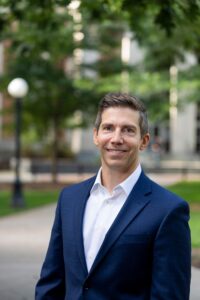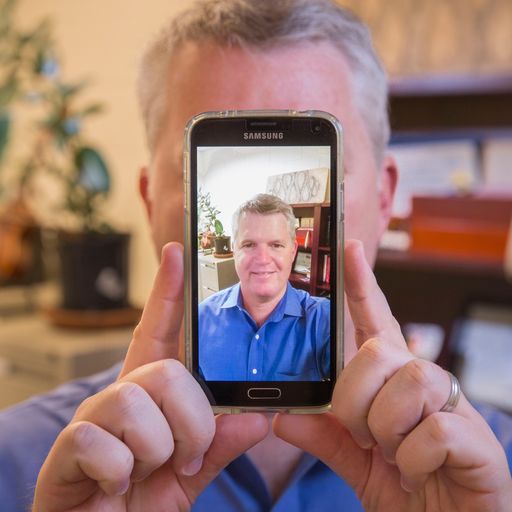psy•chol•o•gy (noun)
The scientific study of the human mind and behavior
The Greatest Disorder Ever
Keith Campbell | Professor of Psychology
One of the most popular majors at the University of Georgia, psychology offers students a broad, science-based education that can be useful in various fields.
And it’s just really cool.
From learning about personality disorders like narcissism to how people set and achieve goals to how we form meaningful connections with others, UGA psychology researchers are conducting work that isn’t just fascinating. It’s useful.
The textbook definition of a narcissist is someone obsessed with themselves.
They’re not just GREAT. They’re the best [fill-in-the-blank] that ever existed. Everything they do is ART.
But decades ago, people barely knew the word narcissist, let alone what traits make one, says Keith Campbell, a narcissism expert and a professor in UGA’s behavioral and brain sciences program.
Now, narcissism is probably one of the most talked-about personality disorders.
Most of the time, when people talk about how narcissistic someone is, they’re thinking of what is actually a normal personality trait.
Just about everyone has some narcissistic tendencies, and that’s not a bad thing, Campbell says. Confidence can help you get the job or lead your team to victory, after all.
But when it reaches a point of clinical significance, narcissism takes on a different meaning.
People with grandiose narcissistic personality disorder have such an inflated sense of self-worth that it makes them incapable of forming healthy relationships. They lack empathy. They need constant praise. And they can lash out when criticized.
“You could be really good at becoming a leader because of your narcissism, but you may be too self-centered and a little corrupt,” Campbell explains. “And that might destroy or kind of impede your ability to be a leader over time. Or you could be really good at starting relationships, but to transition from a dating relationship to a more emotionally committed marriage, you’re not going to be so good at that.”
So can you “fix” a narcissist? Maybe.
Like those with antagonistic personality disorder, the verdict is out on how many narcissists actually WANT to change.
They are perfect specimens, after all.
#Goals
Michelle vanDellen | Associate Professor of Social Psychology
As the New Year rolls around, Michelle vanDellen will be waiting for it—the whole “New Year, New Me” phenomenon when people decide they’ll actually make a change. They’ll eat organic foods, exercise more, and do so regularly.
And one by one, those proclamations will crumple like so many discarded $1.99 party hats.
As a researcher who specializes in goals and how people’s thoughts and motivations influence those goals, vanDellen finds it interesting that people focus on these signposts of a supposedly healthy lifestyle.
“I always say goals are often things that people don’t necessarily know they have,” she says. “Goals to be a supportive relationship partner, goals to think positively about themselves, goals to feel accomplished—people don’t really think about those.”
The way people think shapes the goals they pursue, and the goals they pursue often shape the way people think, vanDellen says.
People wanting to eat in moderation, for instance, are more likely to be biased as to what moderation means when it comes to the foods they like.
Take vanDellen. She’s an avid Diet Coke drinker, so if you asked her how much Diet Coke is a moderate amount to consume, “I’d be like, ‘Oh, a liter a day? That’s probably fine,’” she says with a laugh. “But if you ask about regular Coke, I’m like, ‘No. Sugary beverages are bad. You should only maybe have a can a week.’”
It’s all about perspective.
So the next time you’re setting personal objectives, consider both what’s achievable and where your biases may blind you. It just might help you crush your goals.
Social media
Josh Miller | Professor and Chair of the Clinical Psychology Program

Josh Miller is a professor and chair of the Clinical Psychology Program at the University of Georgia.
Josh Miller is both fascinated and horrified by what he sees on social media.
“I was just looking at someone on Twitter today and was like, ‘Holy cow. The narcissism is so unbelievable,’” Miller says.
To even the untrained eye, narcissists seem to abound online.
The Kar-Jenners, for example, are a masterclass in narcissism.
Kim Kardashian posting videos of her asking her children how much they love her. Kylie Jenner asking her boyfriend publicly on Instagram whether he wanted to take her private jet or his. Or her mother’s response when she commented “decisions, decisions” on the same post.
(Miller refrains from making personality disorder diagnoses from afar. But surely if the Kar-Jenners aren’t narcissists, who is? That’s this writer’s take, anyway.)
But it’s not a trait confined to celebrity.
Look at your Instagram or Facebook feed, and you’ll likely see at least a handful of gratuitous selfies searching for online validation.
“And I love seeing it because it’s part of my research,” Miller says.
Miller studies personality disorders. He’s particularly interested in those related to antisocial and aggressive behaviors, like psychopathy and narcissism, and the frequently unpleasant behaviors accompanying them. But his research shows that not everyone with these traits thinks they’re wholly bad.
People with an antagonism-based personality disorder, for example, disregard others’ needs. They’re self-centered, callous, and often willing to manipulate others to get what they want. And many of them recognize that their disorder blocks their ability to form lasting, fulfilling relationships.
But when asked if they want to change, they’ll often hedge.
“On the one hand, they’re saying, ‘It hurts my life. My wife wants me to be nicer,’” says the professor of psychology. “‘But on the other hand, this is what makes me good at my job: Nobody pushes me around.’”
With a Little Help from My Friends
Richard Slatcher | Gail M. Williamson Distinguished Professor in Psychology

Richard Slatcher is a Gail M. Williamson Distinguished Professor in Psychology at the University of Georgia.
There are a lot of ways to try to be happier in your romantic relationships.
Communicate openly. Say “I love you” more. Learn your partner’s love language. (That last one isn’t particularly scientific, but it’s fun even if there isn’t any clinical significance to the concept.)
“Relationships are the most important thing in the world. They are what get us up in the morning.”
—Richard Slatcher
But one way to improve your love life you might not have thought about is finding other couple friends—ones that are happy in their relationships, specifically.
Richard Slatcher found that couples with more shared friends were more satisfied in their romantic relationships.
Using a method called Fast Friends, Slatcher and his colleagues introduced couples to one another with fun icebreakers that are scientifically proven to help people form bonds quickly.
“We brought in pairs of couples and had them go through this, and a full third of them actually became friends in real life,” Slatcher says. “I’m not sure I would like to go out with a third of the couples I meet in daily life, so this was pretty effective. We found that immediately after this interaction, couples felt better about their own relationships. They felt closer to their romantic partners.”
While an admirable goal in and of itself, that relationship satisfaction has an added bonus: physical health. In another study, Slatcher showed that the happier people were in their relationships, the better their health tended to be.
“Relationships are the most important thing in the world,” he says. “They are what get us up in the morning. They are the thing that usually bring us the most joy, sometimes the most heartache. They are vitally important, from an evolutionary standpoint, to our survival.”









